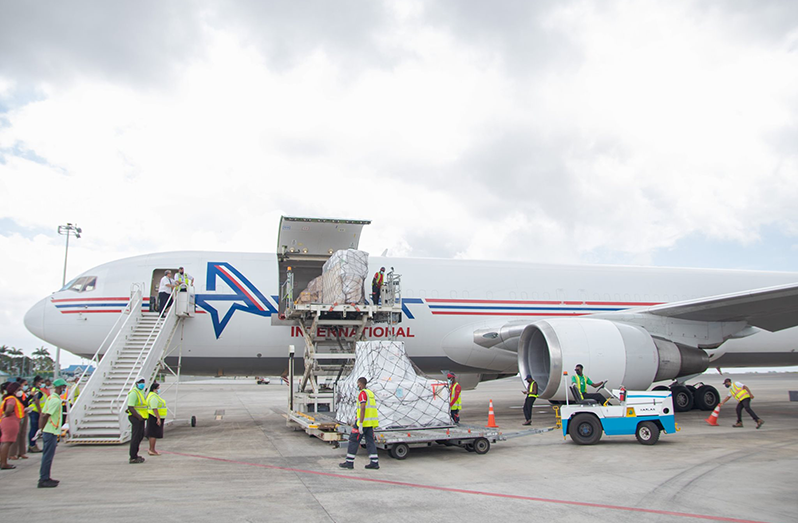WITH 63,740 individuals already receiving their first dose of one of the three COVID-19 vaccines being administered locally, Minister of Health, Dr. Frank Anthony, has said that Guyana will be receiving its third set of the Russian Sputnik V vaccines on Thursday.
On Monday, Guyana received an additional 30,000 doses of the Russian Sputnik V vaccine after getting an initial 25,000 doses at the beginning of April. A total of 200,000 doses of this Russian vaccine was purchased for US$4M (approximately G$800M) by Guyana, through an arrangement with the United Arab Emirates (UAE).
“We are happy to get the second tranche of the Sputnik V vaccine… later in the week we are expecting some more vaccines,” Minister Anthony said on Tuesday, during his daily COVID-19 update.
Later in his presentation, on the same day, the minister said that the vaccines would arrive on Thursday.
The vaccine has about a 91.6 per cent efficacy and it is administered in two doses, given 28 days apart. And on Monday, during his daily COVID-19 update, Dr. Anthony highlighted that this particular vaccine required cold chain storage at a temperature of about -18 degrees to -20 degrees.
It is important to note, however, that there was a dearth of experience using vaccines that require cold chain storage in Guyana. It is for this reason that local health personnel had to receive training on how to administer this Russian vaccine.
With this second consignment of the Sputnik V vaccines already in Guyana, the Health Minister said that there would be a more efficient roll out, since health workers would be better acquainted.
On Tuesday, he indicated that there has been stringent management of these Sputnik V vaccines due to its cold storage requirements. He explained that when these vaccines are removed from the freezers and left to thaw, before being administered to an individual, they cannot be put back into the freezer. If these vaccines are not used, they will spoil and have to be thrown away.
“We are going to scale this up as our staff become more proficient in the use of these vaccines,” the Health Minister said, adding: “We have deployed in the different regions enough vaccines for them to use and to make sure that this programme is ongoing.”
Despite the adequate distribution of vaccines, he acknowledged that there are some logistical challenges to surmount in the hinterland regions due to the geographical spread of some of the villages.
COVAX VACCINES
Additionally, the minister said that additional vaccines scheduled to be provided to Guyana through the COVAX facility is expected to arrive in Guyana sometime before May. No definitive date was given. The COVAX facility is a global mechanism that was created to ensure the equitable distribution of COVID-19 vaccines. COVAX is made up of the Coalition for Epidemic Preparedness Innovations (CEPI); Gavi, the Vaccine Alliance Gavi; the United Nations Children’s Fund (UNICEF); the Pan American Health Organisation (PAHO); the World Health Organisation (WHO) and other stakeholders. Through this facility, Guyana has already received 24,000 doses of the Oxford-AstraZeneca vaccine. And, during the initial distribution phase, which is still ongoing, Guyana is expected to receive a total of 100,800 doses of vaccine from COVAX.
At the sidelines of an event on Monday, President, Dr. Irfaan Ali, lamented that sourcing vaccines has been a challenge owing to the global demand for these commodities.
“Most countries are going through a spike (in COVID-19 cases) so getting the vaccine itself is a great difficulty,” the President said.
He added that the production line of some of the more popular vaccines including the Pfizer, Moderna and AstraZeneca vaccines has become “stressed”.
Even so, he reminded members of the media that Guyana has been able to secure 200,000 doses of the Sputnik V vaccines and that the country would be expecting another 200,000 doses later. Explaining why these Russian vaccines have been arriving in smaller tranches, the President noted that the procurement of the vaccines also present logistical challenges. These challenges include getting specialised air and land transport, cold storage and transporting the supplies in a short period.
“The logistics is a great bugbear and also now it is getting more and more difficult to get supplies,” the President lamented.




.jpg)










